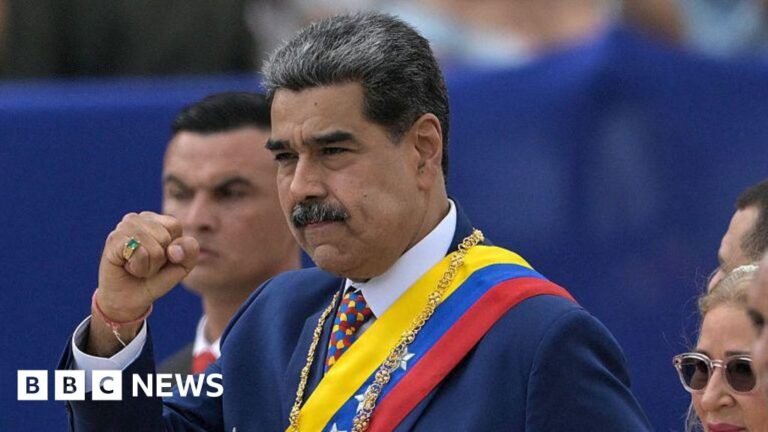The US has doubled a reward for information leading to the arrest of Venezuelan President Nicolás Maduro to $50m (£37.2m), accusing him of being “one of the largest narco-traffickers in the world”.
US President Donald Trump is a long-time critic of Maduro, who returned to office in January following an election marred by vote-rigging allegations. The results were widely rejected by the international community.
Attorney General Pam Bondi said the US would double its already announced reward of $25m (£18.6m), and said Maduro was directly linked to drug smuggling operations.
Venezuelan Foreign Minister Yvan Gil said the new reward was “pathetic” and labelled it “political propaganda”.
“We’re not surprised, coming from whom it comes from,” Gil said, accusing Bondi of attempting a “desperate distraction” from headlines related to backlash over the handling of the case of sex offender Jeffrey Epstein.
During Trump’s first term, the US government charged Maduro and other high-ranking Venezuelan officials with a range of offences, including narco-terrorism, corruption and drug trafficking.
At the time, the US Department of Justice claimed Maduro had worked with the Colombian rebel group Farc to “use cocaine as a weapon to ‘flood’ the United States”.
In a video posted on X on Thursday, Bondi accused Maduro of coordinating with groups like Tren de Aragua – a Venezuelan gang that the Trump administration has declared a terrorist organisation – and the Sinaloa Cartel, a powerful criminal network based in Mexico.
She claimed the US Drug Enforcement Administration (DEA) had “seized 30 tons of cocaine linked to Maduro and his associates, with nearly seven tons linked to Maduro himself”.
Maduro has previously rejected US claims he has direct involvement in drug trafficking.
Bondi’s comments are an extension of long-running tensions between the US and Venezuelan government – but the attorney general did not provide any further indication over how the government envisioned the renewed appeal and cash incentive would yield results.
Maduro – who is leader of the United Socialist Party and succeeded Hugo Chavez in 2013 – has been repeatedly accused of repressing opposition groups and silencing dissent in Venezuela, including with the use of violence.
He weathered protests in the wake of last year’s contested election and has retained his grip on power.
But in June, Hugo Carvajal – formerly the head of Venezuela’s military intelligence – was convicted of several drug trafficking charges after being arrested in Madrid and put on trial in the US.
Carvajal had been a feared spymaster who went by the name El Pollo, or The Chicken, but fled Venezuela after calling on the army to back an opposition candidate and overthrow Maduro.
He initially denied the drug charges but later changed his plea to guilty, fuelling speculation he had cut a deal with US authorities for a lesser sentence in exchange for incriminating information about Maduro.
The UK and EU announced sanctions against Maduro’s government following his return to office earlier this year.




